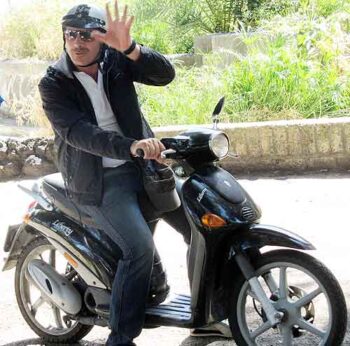
Denouement. None of us wanted to leave the park. After the demos, the dinner, and the as-yet-untold experience on the buses, after the conversation, the exchange of trade secrets, the trust, and yes, the new friendships, we sort of bonded. And I mean all of us: the band of thieves, the filmmaking crew, and the Arnos in the middle.
We stand there in the park in two concentric circles. The inner circle is Bob, Michele, Frank, Andy, and Marc. The outer circle is Van with the Red on his shoulder and his assistant holding his shoulders to guide him, director Kun, producer Kath, fixer Rosie, and me. None of us want to say goodbye.
Work finally pulls Marc and Andy away, but Frank remains. And finally, after two complete rounds of hugs and kisses, Frank straddles his bike, snaps on his helmet, and rides away. Van follows him with the camera until he’s out of sight.
We’re all physically and mentally exhausted; spent. I don’t know how the crew kept going; they were up hours before us every day and working for hours after we said goodnight. Yesterday they went nonstop from the market to the thieves’ restaurant to the second restaurant without a break, setting up and taking down equipment repeatedly. They are champions, all of them.
Making this documentary allowed Bob and me to fulfill certain long-held dreams. It allowed us the time in which to develop relationships with our subjects. It allowed us to have top-notch translators, especially my hero Michele. It enabled us to host our gang of thieves at a meal that Bob and I alone would need investors to fund, but which was integral to the building or our relationship, which gave us the ability to dig deeper into the life and times of pickpockets. And lastly, the documentary gives a soapbox to the subjects, a platform for the pickpockets themselves to explain their methods and motivations, their regrets and their desires.
Writing these stories has been difficult for me. The “easy difficulty,” if there is such a thing, has been simply finding the time to write in the midst of our action-packed days, and then finding an internet connection to get them online. But that’s just a technicality. The true difficulties have been several.
First, whitewashing our incredible host city [Naples!], and by necessity, the characters and true identities of the men in our story. How I had to restrain myself! As a writer, I tend to be of the descriptive sort. I would never say we drank “liqueur!” I want to say what kind [Limoncello], what color [sunshine yellow], and how lovely the fruit it was made from [lemons]. I want to tell about the marvelous restaurants we visited and the wonders of the local cuisine. I want to praise our cliffside hotel [San Francesco al Monte] and describe the view from its terraces, that you can see all the way to …
Sigh.
And—wait a minute! What will this film do to tourism in this mystery town? Will we repel visitors, or intrigue them? Our goal is to balance the stardust with the dirt, to spotlight the unique riches this place has to offer. We hope it comes through in the film. I certainly left it out of these stories.
And there is something of a moral dilemma. In an exchange of thievery techniques, are we teaching known criminals how to steal more and better? We don’t think so, but how do you see it? What about the techniques the general public will learn from watching the film—should we be concerned about how that knowledge may be used? We don’t think so, but we agree that it looks bad—as if we’re teaching how to steal.
I’m afraid of what the public will think of Bob and me in our pursuit of thieves. Will you chastise us for not stopping thefts when we see them? Or will you understand that our method, getting “in” with these criminals, has a greater end? Will you think us awful for liking the pickpockets, despite knowing what havoc they wreak, what distress they cause? In the film, it will be up to Kun to portray us honestly alongside our motives. But here in these writings, it was my responsibility. Do you think it’s all fun and games for us, that we dine with thieves for a lark? Do you understand that as outsiders, allowed into an underground brotherhood of thieves, we are able to gather knowledge for the greater good? Please comment. We need to know if we should hide under a rock when the film comes out.
We are incredibly grateful to film director Kun Chang, who has pushed this project forward for more than four years already. Bob and I have complete faith in him and have no doubt that he’ll put together a documentary that is as beautiful and dramatic as it is fascinating and educational.
While the shooting isn’t over, the exciting part is. What’s left is hard work, mostly by Kun and his editing team. It’s impossible for me to imagine how they’ll make sense of the vast amount of gripping footage we have accumulated. I also recognize that my perception of the experience is not the same as Kun’s. The sterile, stripped-down story I told here, missing highlights (believe it or not), missing local color (of which there’s tons), genericizing everything for the sake of the eventual film, may have little resemblance to Kun’s vision. We will all be surprised at the film: you, readers; and Bob and I.
This is Part 21 of THE MAKING OF OUR NATIONAL GEOGRAPHIC DOCUMENTARY, PICKPOCKET KING. The film is about us, Bob Arno and Bambi Vincent. We are “thiefhunters in paradise.” The paradise we chose for the story is the warm and wild city of Naples, Italy, home to the world’s best pickpockets. The documentary premieres December 2 at 8pm ET/PT on the National Geographic Channel.
—Originally posted 10/5/10 and soon thereafter password-protected at the request of the producer.




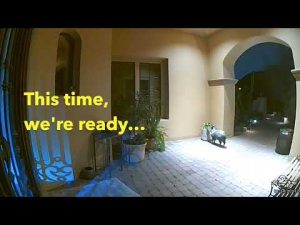
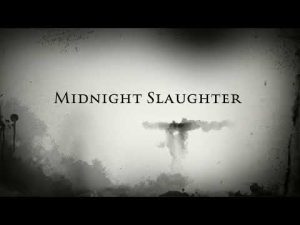
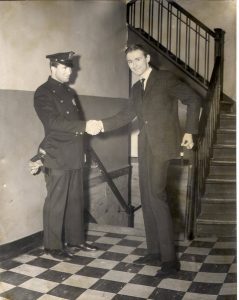
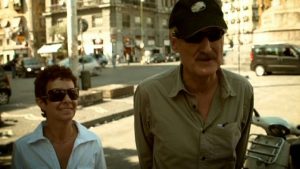
1 Comment
[…] Post navigation ← Previous Next → […]